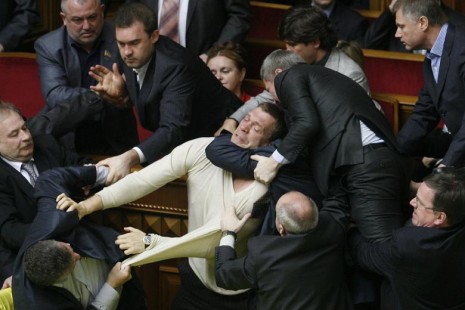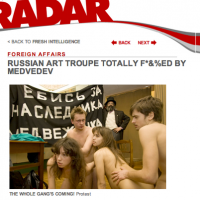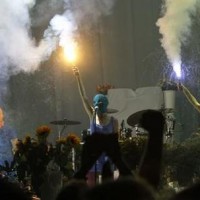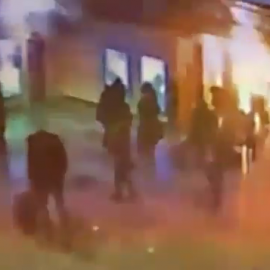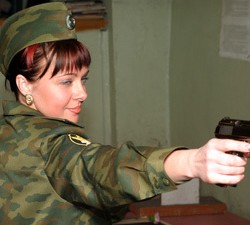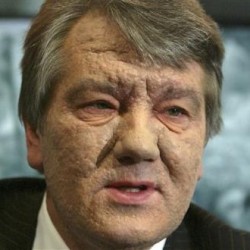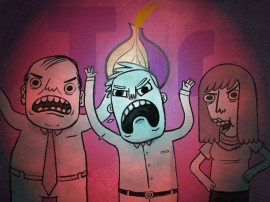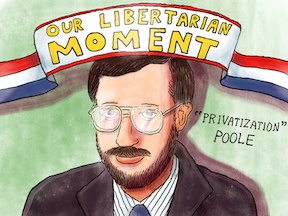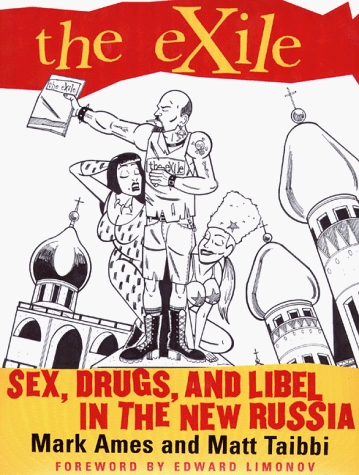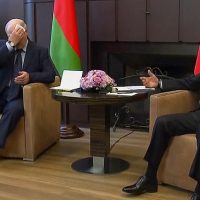| But there is not any “final” thing in politics, least of all in Ukrainian politics, or Eastern European politics in general. The keys to understanding today’s political landscape in Ukraine can be found not in the European Enlightenment philosophy of the 18th century, or the Russian political discourse of “slavophiles” vs. “westernizers” of the 19th century. Instead, one should reach back to the genius of the Ukrainian soul revealed some 150 years ago by Nikolai Gogol. Not his St. Petersburg stories, but wild folksy tales from the Ukrainian countryside — from “Taras Bulba” to “Evenings near Dikan’ka”, to “Vij” — crazy, passionate, irrational, with unruly Cossacks and wily peasants, with mythical creatures of the night and the underworld messing up human affairs. Gogol’s name is in fact a popular brand, claimed by both Ukrainian and Russian cultures (in itself an indication that they are pretty close indeed, despite the claims of petty nationalists). There is a new punk group, Gogol Bordello, consisting mostly of Ukrainian immigrants living in New York, whose lead singer also played the main role in the film adaptation of Everything is Illuminated, based on a recent quirky best-seller by Jonathan Safran Foer. Their music is a wild combination of a classical Russian “blatnoy” chanson, gypsy dances and Ukrainian folk-tunes, sung in horribly-accented English. There is plenty of such stuff both in Russia and Ukraine (except for the English lyrics), but now Gogol Bordello has an international appeal beyond the local emigre crowd: they toured all over the U.S. and Europe and recently performed on the Conan O’Brian show. You probably won’t find a better analogy for Ukrainian politics today. In Russia, Putin’s reign produced a faux-imperial center, with the restoration of many Soviet and some Tsarist traditions, with United Russia — the “party of power” — dominating the legislature. True, there is a colorful and very noisy fringe around the center, consisting of every tinge from the mystical conservative nationalists to delusional pro-Western liberals, but mainly they’re just providing a circus-like entertainment for the media and political “tusovka.” In Ukraine this fringe circus IS the politics — without anything resembling the stodgy, predictable center. You have a wild assortment of demagogues, nutcases and plutocrats with shifting alliances, silly slogans and their inevitable sponsorship by various rival oligarchic clans, still squabbling for privatization and re-privatization spoils.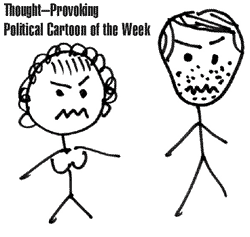 President Viktor Yushchenko fires former-ally Yulia Tymoshenko It’s a “Gulyay-Pole” of shifting sands and changing winds. Consider this schizophrenic sequence: the first Ukrainian president Leonid Kravchuk was once a loyal Communist Party secretary who flirted with the nationalist opposition in the last years of the USSR, but he also quietly supported the anti-Gorbachev putsch in August 1991. After the coup failed and central authority in Moscow essentially evaporated, Kravchuk became the main proponent of Ukrainian independence. In fact, he was largely responsible for the dissolution of the Soviet Union in the following months. Then in 1994, as the newly independent Ukraine was in the middle of an economic collapse, and Kravchuk’s nationalist rhetoric lost its appeal, Leonid Kuchma won Ukraine’s presidential elections on a platform of economic pragmatism and closer relations with Russia. Kuchma switched his course many times during his presidency, alternatively courting and alienating Russia and the West. So did most of the other players in the Ukrainian political and economic elite. Ironically, Kravchuk in the last elections found himself supporting the Yanukovych camp, advocating some of the most pro-Russian positions in current Ukrainian politics, a complete turnaround from where he was in the early 90s. In the late 80s and early 90s there was a vehemently nationalistic politician named Vyacheslav Chornovil, leader of the popular anti-communist Rukh movement. He later died in mysterious circumstances in an automobile accident in 1999. His son, Taras Chornovil, is now a prominent politician from the other end of the spectrum: he served as an advisor to the pro-Russian Yanukovych campaign in the fall of 2004. The list goes on and on — there are plenty of other examples of alliances and affiliations changing chaotically many times. Revolutions do eat their children — it is a fairly common fate. But few expected such a rapid, incredible unraveling as what happened after the Orange Revolution. In the first months of the Yushchenko-Tymoshenko government the economy nosedived. Instead of attracting foreign investments, both from Russia and Europe, investors were scared away en masse by Tymoshenko’s militant re-privatization talk. During the spring and summer the government managed to stumble into the “gasoline crisis,” the “flour crisis,” the “sugar crisis” and so on — all of them completely unnecessary — without producing even a fraction of promised and advertised reforms. From the rapid 12% growth of last year, and around 10% average for the Kuchma’s second term in office, growth slowed down to some 5% in the first half of this year and came to a halt in recent months (in August there was even an economic contraction). The first corruption scandals of the new government already exploded, and utter incompetence in many areas became too painfully visible. Last month, as a result of the long and bitter dispute between two large oligarchic groups — one supported by Tymoshenko, the other by well-known smooth operator Poroshenko, who held the post of Secretary of the Security Council — the whole government resigned and Tymoshenko is now a fierce populist critic of the Yushchenko presidency. As if there weren’t enough shenanigans by the leaders of the “new Ukraine,” their kiddies in just the last few months demonstrated plenty of rather peculiar behavior. First, Yushchenko’s son Andrei made himself known to the local paparazzi by cruising around Kiev in a luxurious BMW (costing reportedly some $130,000), flashing around a $25,000 cell phone, and spending thousands of dollars in the best restaurants. Once he left his car parked practically in the middle of the main Kiev thoroughfare, blocking traffic for hours, while having one of his famous nightlife outings with his girlfriend. The incident was too much to ignore, and was picked up by the local muckraking media. Later the nerdish Minister of the Interior Yuriy Lutsenko himself issued Yushchenko’s son a fine, equivalent to $3, in a televised session of the Rada (parliament), only to discover a few days afterwards that he didn’t have authority to do even that. It’s not clear to this day whether little Andrei Yushchenko actually parted with those three bucks as a severe punishment for his inappropriate behavior. Yushchenko the President promptly made a fool of himself by attacking the journalists who dug up this whole story, yelling at the reporter who asked him about his son (the president had to apologize later). But that still wasn’t the main course of this spicy feast: a couple of weeks later it became known that Andrei Yushchenko somehow became the owner of the “Orange revolution” brands and trademarks. That’s right, folks: you thought that hundreds of thousands of orange-clad people demonstrating for many weeks on the snowy Maidan were fighting for “democracy,” “justice,” the “new, truly independent Ukraine”? Bwa-ga-ga!!! No, actually it was just a promo party for a new brand, with some cute logo and catchy tunes, owned by a 19-year- old “golden youth” with expensive tastes and a daddy who now owns the whole casino. But Yulia Tymoshenko’s offspring weren’t too much behind. In late September the young, hot Evgenia Tymoshenko, 25 years old, married Sean Carr, 35 — the “aspiring” British rocker of the little-known heavy metal band “Death Valley Screamers” — in a heavily publicized ceremony in an ancient monastery near Kiev. Sean Carr looks like he might play a cut-throat in a pirate movie (no Johnny Depp here) and has a history of domestic abuse on his former wife (he was sentenced to two years probation). Yevgenia met him in a posh Mediterranean resort where she was vacationing from her studies in the London School of Economics, after spending almost a decade in an expensive private school in England. Not bad for a girl born in the grey industrial city of Dnepropetrovsk, where her mother began her career by marrying the son of a local Communist Party boss as a cute 18-year-old babe (and ditching him years later). There was a saying about Romania at the end of the 19th century (attributed alternatively to Bismarck or Tsar Nicolas II): “Romania is not a country, it is a profession.” During the Kuchma presidency, to stress his independence credentials, Kuchma wrote a book, “Ukraine is not Russia.” It seems that given the present course of events the next big statement from the Ukrainian political leadership could be “Ukraine is not Romania” (but it could be Albania). And few would consider it a compliment to Ukraine. And much of the world would still wonder whether Ukraine is not that funny little Dikan’ka village from Gogol’s magical folksy tales. This article was first published in The eXile on October 21, 2005 |



